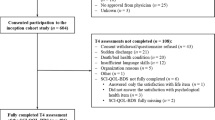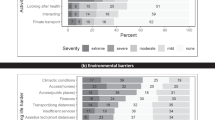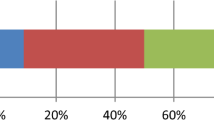Abstract
Study design:
Cross-sectional validation study.
Objectives:
To examine the construct and concurrent validity of the International Spinal Cord Injury (SCI) Quality of Life (QoL) Basic Data Set.
Setting:
Dutch community.
Participants:
People 28–65 years of age, who obtained their SCI between 18 and 35 years of age, were at least 10 years post SCI and were wheelchair users in daily life.
Measure(s):
The International SCI QoL Basic Data Set consists of three single items on satisfaction with life as a whole, physical health and psychological health (0=complete dissatisfaction; 10=complete satisfaction). Reference measures were the Mental Health Inventory-5 and three items of the World Health Organization Quality of Life measure.
Results:
Data of 261 participants were available. Mean time after SCI was 24.1 years (s.d. 9.1); 90.4% had a traumatic SCI, 81.5% a motor complete SCI and 40% had tetraplegia. Mean age was 47.9 years (s.d. 8.8) and 73.2% were male. Mean scores were 6.9 (s.d. 1.9) for general QoL, 5.8 (s.d. 2.2) for physical health and 7.1 (s.d. 1.9) for psychological health. No floor or ceiling effects were found. Strong inter-correlations (0.48–0.71) were found between the items, and Cronbach’s alpha of the scale was good (0.81). Correlations with the reference measures showed the strongest correlations between the WHOQOL general satisfaction item and general QoL (0.64), the WHOQOL health and daily activities items and physical health (0.69 and 0.60) and the Mental Health Inventory-5 and psychological health (0.70).
Conclusions:
This first validity study of the International SCI QoL Basic Data Set shows that it appears valid for persons with SCI.
Similar content being viewed by others
Log in or create a free account to read this content
Gain free access to this article, as well as selected content from this journal and more on nature.com
or
References
Post MW, van Leeuwen CM . Psychosocial issues in spinal cord injury: a review. Spinal Cord 2012; 50: 382–389.
Hill MR, Noonan VK, Sakakibara BM, Miller WC . Quality of life instruments and definitions in individuals with spinal cord injury: a systematic review. Spinal Cord 2010; 48: 438–450.
Dijkers MP . Quality of life of individuals with spinal cord injury: a review of conceptualization, measurement, and research findings. J Rehabil Res Dev 2005; 42: 87–110.
Post M, Noreau L . Quality of life after spinal cord injury. J Neurol Phys Ther 2005; 29: 139–146.
Post MW . Definitions of quality of life: what has happened and how to move on. Top Spinal Cord Inj Rehabil 2014; 20: 167–180.
Alexander MS, Anderson KD, Biering-Sorensen F, Blight AR, Brannon R, Bryce TN et al. Outcome measures in spinal cord injury: recent assessments and recommendations for future directions. Spinal Cord 2009; 47: 582–591.
Biering-Sørensen F, Charlifue S, DeVivo M, Noonan V, Post M, Stripling T et al. International spinal cord injury data sets. Spinal Cord 2006; 44: 530–534.
Charlifue S, Post MW, Biering-Sørensen F, Catz A, Dijkers M, Geyh S et al. International spinal cord injury quality of life basic data set. Spinal Cord 2012; 50: 672–675.
Wood-Dauphinee S, Exner G, Bostanci B, Glass C, Jochheim KA, Kluger P et al. Quality of life in patients with spinal cord injury—basic issues, assessment, and recommendations. Restor Neurol Neurosci 2002; 20: 135–149.
Biering-Sørensen F, Alexander MS, Burns S, Charlifue S, DeVivo M, Dietz V et al. Recommendations for translation and reliability testing of International Spinal Cord Injury Data Sets. Spinal Cord 2011; 49: 357–360.
Adriaansen JJ, van Asbeck FW, Lindeman E, van der Woude LH, de Groot S, Post MW . Secondary health conditions in persons with a spinal cord injury for at least 10 years: design of a comprehensive long-term cross-sectional study. Disabil Rehabil 2013; 35: 1104–1110.
Kirshblum SC, Burns SP, Biering-Sorensen F, Donovan W, Graves DE, Jha A et al. International standards for neurological classification of spinal cord injury (revised 2011). J Spinal Cord Med 2011; 34: 535–546.
Catz A, Itzkovich M, Tesio L, Biering-Sorensen F, Weeks C, Laramee MT, Craven BC et al. A multicenter international study on the Spinal Cord Independence Measure, version III: Rasch psychometric validation. Spinal Cord 2007; 45: 275–291.
Whitehurst DG, Engel L, Bryan S . Short Form health surveys and related variants in spinal cord injury research: a systematic review. J Spinal Cord Med 2014; 37: 128–138.
Van Leeuwen CM, van der Woude LH, Post MW . Validity of the mental health subscale of the SF-36 in persons with spinal cord injury. Spinal Cord 2012; 50: 707–710.
WHOQOL Group. Development of the World Health Organization WHOQOL-BREF quality of life assessment. The WHOQOL Group. Psychol Med 1998; 28: 551–558.
Geyh S, Fellinghauer BA, Kirchberger I, Post MW . Cross-cultural validity of four quality of life scales in persons with spinal cord injury. Health Qual Life Outcomes 2010; 8: 94.
Terwee CB, Bot SD, de Boer MR, van der Windt DA, Knol DL, Dekker J et al. Quality criteria were proposed for measurement properties of health status questionnaires. J Clin Epidemiol 2007; 60: 34–42.
Visser-Meily JM, Post MW, Riphagen II, Lindeman E . Measures used to assess burden among caregivers of stroke patients: a review. Clin Rehabil 2004; 18: 601–623.
Cohen J . Statistical Power Analysis for the Behavioural Sciences. 2nd edn Lawrence Erlbaum: Hillsdale. 1988.
Acknowledgements
ALLRISC is sponsored by ‘Fonds NutsOHRA‘ under the responsibility of the Netherlands Organisation for Health Research and Development (www.ZonMW.nl), Project number 89000006. Data were collected in collaboration with the rehabilitation centers Heliomare (Wijk aan Zee), St Maartenskliniek (Nijmegen), ‘t Roessingh (Enschede), Rijndam/EUR (Rotterdam), Reade (Amsterdam), De Hoogstraat (Utrecht), Adelante (Hoensbroek) and UMCG Centre for Rehabilitation, Location Beatrixoord.
Author information
Authors and Affiliations
Corresponding author
Ethics declarations
Competing interests
The authors declare no conflict of interest.
Rights and permissions
About this article
Cite this article
Post, M., Adriaansen, J., Charlifue, S. et al. Good validity of the international spinal cord injury quality of life basic data set. Spinal Cord 54, 314–318 (2016). https://doi.org/10.1038/sc.2015.99
Received:
Revised:
Accepted:
Published:
Issue date:
DOI: https://doi.org/10.1038/sc.2015.99
This article is cited by
-
The social dimension of quality of life following spinal cord injury or disease: an international ICF-linking study
Spinal Cord (2024)
-
Internal consistency and convergent validity of the International Spinal Cord Injury Quality of Life Basic Data Set at discharge from first rehabilitation
Spinal Cord (2022)
-
Hindi translation and reliability testing of the international spinal cord injury quality of life basic data set version 1.0
Spinal Cord (2022)
-
A cross-cultural mixed methods validation study of the spinal cord injury quality of life basic dataset (SCI QoL-BDS)
Spinal Cord (2022)
-
Does the Danish version of the Spinal Cord Lesion-related Coping Strategies Questionnaire measure what we think it measures? A triangulated mixed-methods validation approach
Spinal Cord (2022)



